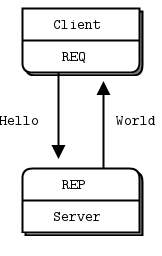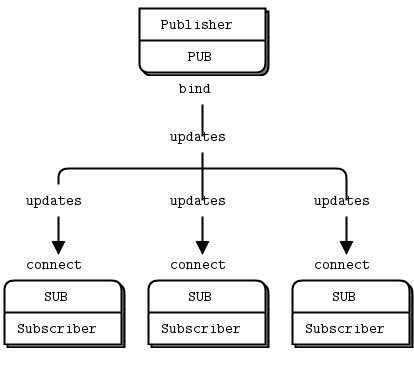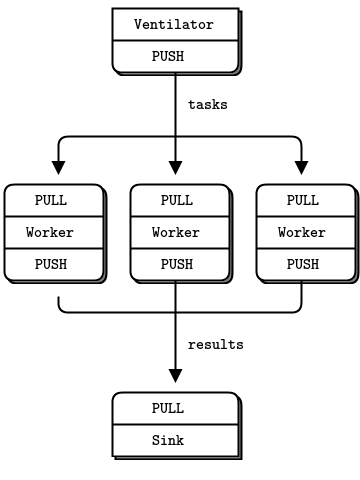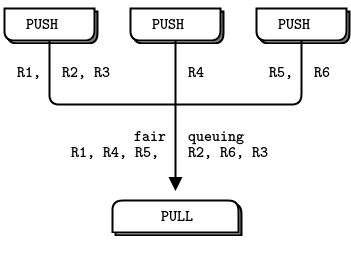
The REQ-REP socket pair is in lockstep. The client issues zmq_send() and then zmq_recv(), in a loop (or once if that’s all it needs). Doing any other sequence (e.g., sending two messages in a row) will result in a return code of -1 from the send or recv call. Similarly, the service issues zmq_recv() and then zmq_send() in that order, as often as it needs to.
ZeroMQ uses C as its reference language and this is the main language we’ll use for examples. If you’re reading this online, the link below the example takes you to translations into other programming languages.
//
// Hello World server in C++
// Binds REP socket to tcp://*:5555
// Expects "Hello" from client, replies with "World"
//
#include <zmq.hpp>
#include <string>
#include <iostream>
#ifndef _WIN32
#include <unistd.h>
#else
#include <windows.h>
#define sleep(n) Sleep(n)
#endif
int main () {
// Prepare our context and socket
zmq::context_t context (2);
zmq::socket_t socket (context, zmq::socket_type::rep);
socket.bind ("tcp://*:5555");
while (true) {
zmq::message_t request;
// Wait for next request from client
socket.recv (request, zmq::recv_flags::none);
std::cout << "Received Hello" << std::endl;
// Do some 'work'
sleep(1);
// Send reply back to client
zmq::message_t reply (5);
memcpy (reply.data (), "World", 5);
socket.send (reply, zmq::send_flags::none);
}
return 0;
}
//
// Hello World client in C++
// Connects REQ socket to tcp://localhost:5555
// Sends "Hello" to server, expects "World" back
//
#include <zmq.hpp>
#include <string>
#include <iostream>
int main ()
{
// Prepare our context and socket
zmq::context_t context (1);
zmq::socket_t socket (context, zmq::socket_type::req);
std::cout << "Connecting to hello world server..." << std::endl;
socket.connect ("tcp://localhost:5555");
// Do 10 requests, waiting each time for a response
for (int request_nbr = 0; request_nbr != 10; request_nbr++) {
zmq::message_t request (5);
memcpy (request.data (), "Hello", 5);
std::cout << "Sending Hello " << request_nbr << "..." << std::endl;
socket.send (request, zmq::send_flags::none);
// Get the reply.
zmq::message_t reply;
socket.recv (reply, zmq::recv_flags::none);
std::cout << "Received World " << request_nbr << std::endl;
}
return 0;
}
// Hello World server
#include <zmq.h>
#include <stdio.h>
#include <unistd.h>
#include <string.h>
#include <assert.h>
int main (void)
{
// Socket to talk to clients
void *context = zmq_ctx_new ();
void *responder = zmq_socket (context, ZMQ_REP);
int rc = zmq_bind (responder, "tcp://*:5555");
assert (rc == 0);
while (1) {
char buffer [10];
zmq_recv (responder, buffer, 10, 0);
printf ("Received Hello\n");
sleep (1); // Do some 'work'
zmq_send (responder, "World", 5, 0);
}
return 0;
}
// Hello World client
#include <zmq.h>
#include <string.h>
#include <stdio.h>
#include <unistd.h>
int main (void)
{
printf ("Connecting to hello world server...\n");
void *context = zmq_ctx_new ();
void *requester = zmq_socket (context, ZMQ_REQ);
zmq_connect (requester, "tcp://localhost:5555");
int request_nbr;
for (request_nbr = 0; request_nbr != 10; request_nbr++) {
char buffer [10];
printf ("Sending Hello %d...\n", request_nbr);
zmq_send (requester, "Hello", 5, 0);
zmq_recv (requester, buffer, 10, 0);
printf ("Received World %d\n", request_nbr);
}
zmq_close (requester);
zmq_ctx_destroy (context);
return 0;
}

Note that when you use a SUB socket you must set a subscription using zmq_setsockopt() and SUBSCRIBE, as in this code. If you don’t set any subscription, you won’t get any messages. It’s a common mistake for beginners. The subscriber can set many subscriptions, which are added together. That is, if an update matches ANY subscription, the subscriber receives it. The subscriber can also cancel specific subscriptions. A subscription is often, but not always, a printable string. See zmq_setsockopt() for how this works.
The PUB-SUB socket pair is asynchronous. The client does zmq_recv(), in a loop (or once if that’s all it needs). Trying to send a message to a SUB socket will cause an error. Similarly, the service does zmq_send() as often as it needs to, but must not do zmq_recv() on a PUB socket.
In theory with ZeroMQ sockets, it does not matter which end connects and which end binds. However, in practice there are undocumented differences that I’ll come to later. For now, bind the PUB and connect the SUB, unless your network design makes that impossible.
There is one more important thing to know about PUB-SUB sockets: you do not know precisely when a subscriber starts to get messages. Even if you start a subscriber, wait a while, and then start the publisher, the subscriber will always miss the first messages that the publisher sends. This is because as the subscriber connects to the publisher (something that takes a small but non-zero time), the publisher may already be sending messages out.
This “slow joiner” symptom hits enough people often enough that we’re going to explain it in detail. Remember that ZeroMQ does asynchronous I/O, i.e., in the background. Say you have two nodes doing this, in this order:
Then the subscriber will most likely not receive anything. You’ll blink, check that you set a correct filter and try again, and the subscriber will still not receive anything.
Making a TCP connection involves to and from handshaking that takes several milliseconds depending on your network and the number of hops between peers. In that time, ZeroMQ can send many messages. For sake of argument assume it takes 5 msecs to establish a connection, and that same link can handle 1M messages per second. During the 5 msecs that the subscriber is connecting to the publisher, it takes the publisher only 1 msec to send out those 1K messages.
In Chapter 2 - Sockets and Patterns we’ll explain how to synchronize a publisher and subscribers so that you don’t start to publish data until the subscribers really are connected and ready. There is a simple and stupid way to delay the publisher, which is to sleep. Don’t do this in a real application, though, because it is extremely fragile as well as inelegant and slow. Use sleeps to prove to yourself what’s happening, and then wait for Chapter 2 - Sockets and Patterns to see how to do this right.
The alternative to synchronization is to simply assume that the published data stream is infinite and has no start and no end. One also assumes that the subscriber doesn’t care what transpired before it started up. This is how we built our weather client example.
So the client subscribes to its chosen zip code and collects 100 updates for that zip code. That means about ten million updates from the server, if zip codes are randomly distributed. You can start the client, and then the server, and the client will keep working. You can stop and restart the server as often as you like, and the client will keep working. When the client has collected its hundred updates, it calculates the average, prints it, and exits.
Some points about the publish-subscribe (pub-sub) pattern:
//
// Weather update server in C++
// Binds PUB socket to tcp://*:5556
// Publishes random weather updates
//
#include <zmq.hpp>
#include <stdio.h>
#include <stdlib.h>
#include <time.h>
#if (defined (WIN32))
#include <zhelpers.hpp>
#endif
#define within(num) (int) ((float) num * random () / (RAND_MAX + 1.0))
int main () {
// Prepare our context and publisher
zmq::context_t context (1);
zmq::socket_t publisher (context, zmq::socket_type::pub);
publisher.bind("tcp://*:5556");
publisher.bind("ipc://weather.ipc"); // Not usable on Windows.
// Initialize random number generator
srandom ((unsigned) time (NULL));
while (1) {
int zipcode, temperature, relhumidity;
// Get values that will fool the boss
zipcode = within (100000);
temperature = within (215) - 80;
relhumidity = within (50) + 10;
// Send message to all subscribers
zmq::message_t message(20);
snprintf ((char *) message.data(), 20 ,
"%05d %d %d", zipcode, temperature, relhumidity);
publisher.send(message, zmq::send_flags::none);
}
return 0;
}
//
// Weather update client in C++
// Connects SUB socket to tcp://localhost:5556
// Collects weather updates and finds avg temp in zipcode
//
#include <zmq.hpp>
#include <iostream>
#include <sstream>
int main (int argc, char *argv[])
{
zmq::context_t context (1);
// Socket to talk to server
std::cout << "Collecting updates from weather server...\n" << std::endl;
zmq::socket_t subscriber (context, zmq::socket_type::sub);
subscriber.connect("tcp://localhost:5556");
// Subscribe to zipcode, default is NYC, 10001
const char *filter = (argc > 1)? argv [1]: "10001 ";
subscriber.setsockopt(ZMQ_SUBSCRIBE, filter, strlen (filter));
// Process 100 updates
int update_nbr;
long total_temp = 0;
for (update_nbr = 0; update_nbr < 100; update_nbr++) {
zmq::message_t update;
int zipcode, temperature, relhumidity;
subscriber.recv(update, zmq::recv_flags::none);
std::istringstream iss(static_cast<char*>(update.data()));
iss >> zipcode >> temperature >> relhumidity ;
total_temp += temperature;
}
std::cout << "Average temperature for zipcode '"<< filter
<<"' was "<<(int) (total_temp / update_nbr) <<"F"
<< std::endl;
return 0;
}
// Weather update server
// Binds PUB socket to tcp://*:5556
// Publishes random weather updates
#include "zhelpers.h"
int main (void)
{
// Prepare our context and publisher
void *context = zmq_ctx_new ();
void *publisher = zmq_socket (context, ZMQ_PUB);
int rc = zmq_bind (publisher, "tcp://*:5556");
assert (rc == 0);
// Initialize random number generator
srandom ((unsigned) time (NULL));
while (1) {
// Get values that will fool the boss
int zipcode, temperature, relhumidity;
zipcode = randof (100000);
temperature = randof (215) - 80;
relhumidity = randof (50) + 10;
// Send message to all subscribers
char update [20];
sprintf (update, "%05d %d %d", zipcode, temperature, relhumidity);
s_send (publisher, update);
}
zmq_close (publisher);
zmq_ctx_destroy (context);
return 0;
}
// Weather update client
// Connects SUB socket to tcp://localhost:5556
// Collects weather updates and finds avg temp in zipcode
#include "zhelpers.h" // 此文件在官方示例代码仓库中
int main (int argc, char *argv [])
{
// Socket to talk to server
printf ("Collecting updates from weather server...\n");
void *context = zmq_ctx_new ();
void *subscriber = zmq_socket (context, ZMQ_SUB);
int rc = zmq_connect (subscriber, "tcp://localhost:5556");
assert (rc == 0);
// Subscribe to zipcode, default is NYC, 10001
const char *filter = (argc > 1)? argv [1]: "10001 ";
rc = zmq_setsockopt (subscriber, ZMQ_SUBSCRIBE,
filter, strlen (filter));
assert (rc == 0);
// Process 100 updates
int update_nbr;
long total_temp = 0;
for (update_nbr = 0; update_nbr < 100; update_nbr++) {
char *string = s_recv (subscriber);
int zipcode, temperature, relhumidity;
sscanf (string, "%d %d %d",
&zipcode, &temperature, &relhumidity);
total_temp += temperature;
free (string);
}
printf ("Average temperature for zipcode '%s' was %dF\n",
filter, (int) (total_temp / update_nbr));
zmq_close (subscriber);
zmq_ctx_destroy (context);
return 0;
}

As a final example (you are surely getting tired of juicy code and want to delve back into philological discussions about comparative abstractive norms), let’s do a little supercomputing. Then coffee. Our supercomputing application is a fairly typical parallel processing model. We have:
In reality, workers run on superfast boxes, perhaps using GPUs (graphic processing units) to do the hard math. Here is the ventilator. It generates 100 tasks, each a message telling the worker to sleep for some number of milliseconds:
//
// Task ventilator in C++
// Binds PUSH socket to tcp://localhost:5557
// Sends batch of tasks to workers via that socket
//
#include <zmq.hpp>
#include <stdlib.h>
#include <stdio.h>
#include <unistd.h>
#include <iostream>
#define within(num) (int) ((float) num * random () / (RAND_MAX + 1.0))
int main (int argc, char *argv[])
{
zmq::context_t context (1);
// Socket to send messages on
zmq::socket_t sender(context, ZMQ_PUSH);
sender.bind("tcp://*:5557");
std::cout << "Press Enter when the workers are ready: " << std::endl;
getchar ();
std::cout << "Sending tasks to workers...\n" << std::endl;
// The first message is "0" and signals start of batch
zmq::socket_t sink(context, ZMQ_PUSH);
sink.connect("tcp://localhost:5558");
zmq::message_t message(2);
memcpy(message.data(), "0", 1);
sink.send(message);
// Initialize random number generator
srandom ((unsigned) time (NULL));
// Send 100 tasks
int task_nbr;
int total_msec = 0; // Total expected cost in msecs
for (task_nbr = 0; task_nbr < 100; task_nbr++) {
int workload;
// Random workload from 1 to 100msecs
workload = within (100) + 1;
total_msec += workload;
message.rebuild(10);
memset(message.data(), '\0', 10);
sprintf ((char *) message.data(), "%d", workload);
sender.send(message);
}
std::cout << "Total expected cost: " << total_msec << " msec" << std::endl;
sleep (1); // Give 0MQ time to deliver
return 0;
}
// Task ventilator
// Binds PUSH socket to tcp://localhost:5557
// Sends batch of tasks to workers via that socket
#include "zhelpers.h"
int main (void)
{
void *context = zmq_ctx_new ();
// Socket to send messages on
void *sender = zmq_socket (context, ZMQ_PUSH);
zmq_bind (sender, "tcp://*:5557");
// Socket to send start of batch message on
void *sink = zmq_socket (context, ZMQ_PUSH);
zmq_connect (sink, "tcp://localhost:5558");
printf ("Press Enter when the workers are ready: ");
getchar ();
printf ("Sending tasks to workers...\n");
// The first message is "0" and signals start of batch
s_send (sink, "0");
// Initialize random number generator
srandom ((unsigned) time (NULL));
// Send 100 tasks
int task_nbr;
int total_msec = 0; // Total expected cost in msecs
for (task_nbr = 0; task_nbr < 100; task_nbr++) {
int workload;
// Random workload from 1 to 100msecs
workload = randof (100) + 1;
total_msec += workload;
char string [10];
sprintf (string, "%d", workload);
s_send (sender, string);
}
printf ("Total expected cost: %d msec\n", total_msec);
zmq_close (sink);
zmq_close (sender);
zmq_ctx_destroy (context);
return 0;
}
Here is the worker application. It receives a message, sleeps for that number of seconds, and then signals that it’s finished:
//
// Task worker in C++
// Connects PULL socket to tcp://localhost:5557
// Collects workloads from ventilator via that socket
// Connects PUSH socket to tcp://localhost:5558
// Sends results to sink via that socket
//
#include "zhelpers.hpp"
#include <string>
int main (int argc, char *argv[])
{
zmq::context_t context(1);
// Socket to receive messages on
zmq::socket_t receiver(context, ZMQ_PULL);
receiver.connect("tcp://localhost:5557");
// Socket to send messages to
zmq::socket_t sender(context, ZMQ_PUSH);
sender.connect("tcp://localhost:5558");
// Process tasks forever
while (1) {
zmq::message_t message;
int workload; // Workload in msecs
receiver.recv(&message);
std::string smessage(static_cast<char*>(message.data()), message.size());
std::istringstream iss(smessage);
iss >> workload;
// Do the work
s_sleep(workload);
// Send results to sink
message.rebuild();
sender.send(message);
// Simple progress indicator for the viewer
std::cout << "." << std::flush;
}
return 0;
}
// Task worker
// Connects PULL socket to tcp://localhost:5557
// Collects workloads from ventilator via that socket
// Connects PUSH socket to tcp://localhost:5558
// Sends results to sink via that socket
#include "zhelpers.h"
int main (void)
{
// Socket to receive messages on
void *context = zmq_ctx_new ();
void *receiver = zmq_socket (context, ZMQ_PULL);
zmq_connect (receiver, "tcp://localhost:5557");
// Socket to send messages to
void *sender = zmq_socket (context, ZMQ_PUSH);
zmq_connect (sender, "tcp://localhost:5558");
// Process tasks forever
while (1) {
char *string = s_recv (receiver);
printf ("%s.", string); // Show progress
fflush (stdout);
s_sleep (atoi (string)); // Do the work
free (string);
s_send (sender, ""); // Send results to sink
}
zmq_close (receiver);
zmq_close (sender);
zmq_ctx_destroy (context);
return 0;
}
Here is the sink application. It collects the 100 tasks, then calculates how long the overall processing took, so we can confirm that the workers really were running in parallel if there are more than one of them:
//
// Task sink in C++
// Binds PULL socket to tcp://localhost:5558
// Collects results from workers via that socket
//
#include <zmq.hpp>
#include <time.h>
#include <sys/time.h>
#include <iostream>
int main (int argc, char *argv[])
{
// Prepare our context and socket
zmq::context_t context(1);
zmq::socket_t receiver(context,ZMQ_PULL);
receiver.bind("tcp://*:5558");
// Wait for start of batch
zmq::message_t message;
receiver.recv(&message);
// Start our clock now
struct timeval tstart;
gettimeofday (&tstart, NULL);
// Process 100 confirmations
int task_nbr;
int total_msec = 0; // Total calculated cost in msecs
for (task_nbr = 0; task_nbr < 100; task_nbr++) {
receiver.recv(&message);
if (task_nbr % 10 == 0)
std::cout << ":" << std::flush;
else
std::cout << "." << std::flush;
}
// Calculate and report duration of batch
struct timeval tend, tdiff;
gettimeofday (&tend, NULL);
if (tend.tv_usec < tstart.tv_usec) {
tdiff.tv_sec = tend.tv_sec - tstart.tv_sec - 1;
tdiff.tv_usec = 1000000 + tend.tv_usec - tstart.tv_usec;
}
else {
tdiff.tv_sec = tend.tv_sec - tstart.tv_sec;
tdiff.tv_usec = tend.tv_usec - tstart.tv_usec;
}
total_msec = tdiff.tv_sec * 1000 + tdiff.tv_usec / 1000;
std::cout << "\nTotal elapsed time: " << total_msec << " msec\n" << std::endl;
return 0;
}
// Task sink
// Binds PULL socket to tcp://localhost:5558
// Collects results from workers via that socket
#include "zhelpers.h"
int main (void)
{
// Prepare our context and socket
void *context = zmq_ctx_new ();
void *receiver = zmq_socket (context, ZMQ_PULL);
zmq_bind (receiver, "tcp://*:5558");
// Wait for start of batch
char *string = s_recv (receiver);
free (string);
// Start our clock now
int64_t start_time = s_clock ();
// Process 100 confirmations
int task_nbr;
for (task_nbr = 0; task_nbr < 100; task_nbr++) {
char *string = s_recv (receiver);
free (string);
if (task_nbr % 10 == 0)
printf (":");
else
printf (".");
fflush (stdout);
}
// Calculate and report duration of batch
printf ("Total elapsed time: %d msec\n",
(int) (s_clock () - start_time));
zmq_close (receiver);
zmq_ctx_destroy (context);
return 0;
}
The average cost of a batch is 5 seconds. When we start 1, 2, or 4 workers we get results like this from the sink:
Let’s look at some aspects of this code in more detail:

The pipeline pattern also exhibits the “slow joiner” syndrome, leading to accusations that PUSH sockets don’t load balance properly. If you are using PUSH and PULL, and one of your workers gets way more messages than the others, it’s because that PULL socket has joined faster than the others, and grabs a lot of messages before the others manage to connect. If you want proper load balancing, you probably want to look at the load balancing pattern in Chapter 3 - Advanced Request-Reply Patterns.
此处可能存在不合适展示的内容,页面不予展示。您可通过相关编辑功能自查并修改。
如您确认内容无涉及 不当用语 / 纯广告导流 / 暴力 / 低俗色情 / 侵权 / 盗版 / 虚假 / 无价值内容或违法国家有关法律法规的内容,可点击提交进行申诉,我们将尽快为您处理。